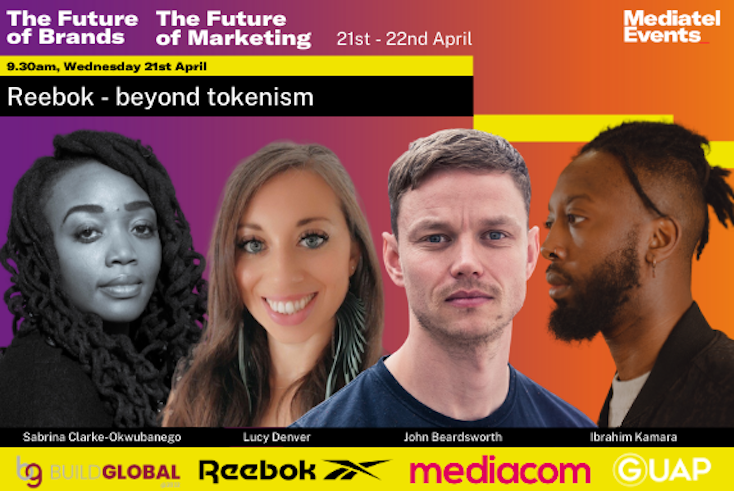Building meaningful & intersectional representation in advertising

In advance of their panel session at Future of Brands, Reebok’s Lucy Denver and her fellow panellists answer questions on representation in advertising
How is Reebok pushing past tokenistic representation?
Lucy Denver: “Truly representing and working with our consumers is a long-standing priority for the Reebok brand. A young woman on a panel I saw a couple of years ago said that, ‘brands have a responsibility to give back to the communities they seek to take money from’ and it really stuck with me. By involving consumers in our campaigns and the decisions we make as a brand, we can give back to the people buying our products in an authentic way.
Speaking from a personal point of view, tokenism often does more harm than good.
Think of the mental health crisis on our hands as a society: tokenism in this field can lead to individuals feeling unheard, misunderstood and alone, and really it is no different in any other area of representation.
I run an organisation called ‘We Are The Antidote’ that offers training in how and why to connect into your holistic health, and breaks the cycle of disease where people feel unable to bring their true selves to work or any other situation. Having a greater appreciation that we are all living, breathing beings and not just a data point on a chart really helps to tackle bias and a lack of representation both in front of and behind the campaign lens.”
What are the practical steps brands can take to ensure their campaigns have meaningful and intersectional representation in their advertising?
John Beardsworth: “By shifting focus away from diversity as a creative platform and focusing on better and more meaningful representation at all stages of the process.
So, for example, shifting focus out of pride into campaigns that speak to the LGBTQ+ community at other moments during the year. By understanding the diversity that exists within your audience or category you can develop campaigns that speak to communities as consumers rather than utilise them as a creative platform.
When it comes to execution, if you have a clear understanding of why you want to say to a specific audience, work with a partner who understands them if they’re not represented in your existing team.
Ensuring that the talent behind the camera matches the talent in front, together with making sure the opportunity and budgets from a project flow into the communities you are featuring, is the simplest way to ensure authentic and believable representation.
How does representative advertising impact the bottom line?
Sabrina Clarke-Okwubanego: “Since 2016, brand loyalty economics has been flipped to customers and consumers, telling brands what they like, how they like it and how they want it to be presented.
Brands of the future have understood the behaviours and the psychology of their customers and consumers, tailoring their advertising accordingly.
For the foreseeable future, consumers are in control, and one of the things being made explicitly clear is that representation in advertising matters.
The activist economy has emerged and centred itself in advertising. Customers and consumers are voting with their pounds, pence and feet, making their voices heard across social media.
The impact on the bottom line of representation in advertising, given the consumer and customer context, is simple – it will either increase or decrease sales.
Whether there is representation from non-traditional demographics or representation that cuts across gender or professional norms, brands that tap into the estimated £500 billion market share that non-traditional demographics hold will continue to reap the rewards of revenue growth.
In contrast, brands that don’t embrace this change will remain stagnant. David Ogilvy wisely said: “The more you tell, the more you sell”. Brands telling stories that are representative is the future.”
How important are partnerships in achieving these goals?
Ibrahim Kamara: “I think partnerships are important to avoid tokenism because when you’re partnering with individuals, you’re sharing a voice, and that person’s voice may be speaking to that audience all the time.
Rather than finding someone online, and picking them to be a part of something, instead by partnering with individuals who are already doing the work on a day to day basis, it’ll come across as more authentic and uplifts the people who are already doing it.”
In one sentence, what will the audience be able to take away from your session?
Lucy: “I hope the session will spark a dialogue: How would you feel if a brand represented you in a tokenistic fashion? What does representation mean to you and to your brand? Are there any practical tips from today that you can implement straight away? And of course, who can you reach out to, to broaden your perspective? There is always more we can all learn, and connectivity is key to growth.”
John: “A new way to approach projects that centre an experience you haven’t lived yourself.”
Sabrina: “Audiences will understand that the formula for representation in adverting is intention and partnerships.”
Ibrahim: “This session will give an honest and open view on how you can reach diverse audiences without tokenism.”
‘Reebok – beyond tokenism’ will be broadcast as part of The Future of Brands, at 9.30am on Wednesday 21 April. Register here




